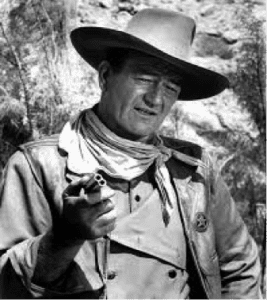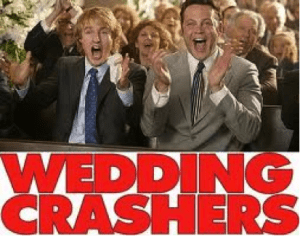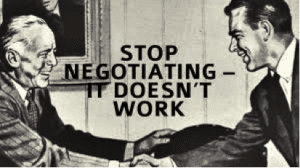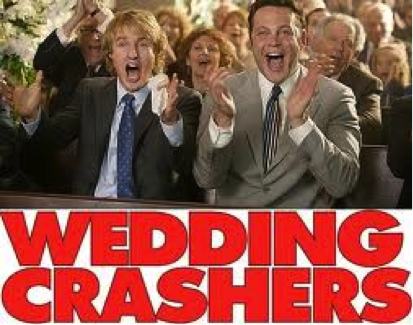Guest Contributor Anna Nicholas negotiates popular culture by dialing back the pressure to create conflict.
Peace is sexy. But if you look at popular culture and fictionalized entertainment, regardless of whether it’s written or filmed, peace is, well—boring, hard to explain and possibly even dangerous. There are a few reasons for this but if we have any hope of turning these perceptions around, we need to examine why such sentiments exist.
Let’s start with the notion that peace, whether an understanding between neighbors, spouses or a multi-country post-uprising resolution, generally gets forged through negotiation*—a process that most of us engage in every day. Yet throughout history negotiation has been viewed as suspect. After all, the word mediation in Persian means “meddling” and we can’t forget that Satan, the archetype of evil, negotiated for human souls.
 According to Robert Benjamin, a mediator and author who conducts conflict management training worldwide, Western cultures have historically viewed negotiation, and its offspring, mediation, as signs of weakness—the choice of the faint of heart, not the hero—and this strong cultural antipathy remains. Benjamin asks, “Would John Wayne, that American cultural icon, negotiate?”
According to Robert Benjamin, a mediator and author who conducts conflict management training worldwide, Western cultures have historically viewed negotiation, and its offspring, mediation, as signs of weakness—the choice of the faint of heart, not the hero—and this strong cultural antipathy remains. Benjamin asks, “Would John Wayne, that American cultural icon, negotiate?”
This highlights another reason for the negative, if not confused perception of negotiation in the lay population: Consumable fictional entertainment is filled with conflict. In fact most of our stories, which have withstood the test of time, including Shakespeare’s Complete Works and The Bible, present core dramatic conflict. And the perceived need for conflict persists. Indeed, as a student of both writing and acting, I was instructed that the characters we create and infuse with life must have conflict. “Characters need obstacles to fight against in order to make them compelling,” or so our teachers told us. It’s good vs. bad, right vs. wrong; it’s war. Worthy characters might lose their lives but never their principles: Antigone refused to play by the rules; in Braveheart, Mel Gibson, as William Wallace, yells, “Freedom!” seconds before he’s beheaded. What makes us want to watch or continue to read, the purveyors of story say, is the struggle.
They have a point. Though shuttle diplomacy might be interesting to those of us in the Peace field, we mediators don’t generally capture the imagination of Hollywood nor the world at large. There aren’t many films like Lincoln, based on Doris Kearns Goodwin’s Team of Rivals, which made the slow passage of the 13th Amendment riveting. Sure, there have been characters created to play the role of negotiator, intermediary, go-between and confidante, but they’re usually supporting characters, rarely the lead. What’s more, if such a character has a career as a mediator** this fact is either irrelevant to the plot, or his job description has been tweaked for entertainment value. Often intermediary characters are created by an author to ensure that things go very wrong for the protagonist: Othello trusted Iago to his (and Desdemona’s) detriment. Some are created to be vilified, as when Bruce Willis tells the mediator in The Fifth Element, “Mediate this, Mother F#@cker,” before eliminating the would-be peacemaker in a burst from his automatic weapon.  And sometimes, as in the case of Wedding Crashers, the fact that a character is a mediator has negligible plot value. Vince Vaughn and Owen Wilson are “divorce mediators” only to provide comic peripheral support for their real mission which is to crash weddings and bed women. The net effect of all these inaccurate, denigrating portrayals is to create a distorted perception in the minds of those watching about what it is we do.
And sometimes, as in the case of Wedding Crashers, the fact that a character is a mediator has negligible plot value. Vince Vaughn and Owen Wilson are “divorce mediators” only to provide comic peripheral support for their real mission which is to crash weddings and bed women. The net effect of all these inaccurate, denigrating portrayals is to create a distorted perception in the minds of those watching about what it is we do.
“Though war (conflict) and negotiation are not polar opposites,” concedes Benjamin, “war (fighting) gets most of the story coverage” and David P. Barash, an evolutionary biologist and professor of psychology at University of Washington, would agree. Barash’s work has exposed the flaw in what has unfortunately become a popular consensus; that humans have a biological predisposition for war. The idea that we are hard-wired for a fight is not borne out by the science; however, he too admits that, “Conflict avoidance and reconciliation—although no less “natural” or important (than the seductive drama of “primitive human war”)—are considerably less attention grabbing.”
And so it persists. Is it that we’ve become so inured to the presentation of conflict as entertainment that we know no other way? Creators of all forms of entertainment tend not to divert very far from their tried and true formula of presenting a “good” character triumphing over the “evil” one. It must be wish fulfillment because as most of us know, it’s certainly not an accurate reflection of real life. It’s also interesting to note that real life portrayals of mediations, such as the one that occurred in Erin Brockovich never made it into the movie.
While it’s true that mediation—moving between rooms, actively listening, speaking rationally and trying to forge an agreement between people in conflict—does not capture the imagination of the audience quite as well as conflict does, Lee Jay Bermen, a mediator and lecturer in Los Angeles, says it’s not for lack of trying. Berman has been approached by several different production companies over the years but invariably ideas are scrapped when they learn that the nature of mediation is not to stir up conflict but, in fact, to resolve it with as little fanfare as possible. Real mediators don’t encourage producers to give an actor a gavel, as happened in season four of The Good Wife, and call it mediation. As Berman says, “What we do is nuanced and difficult to capture, particularly visually.” This is why authors and producers push the bounds of what we do in popular culture, creating characters who mediate between ghosts (Meg Cabot’s Mediator Series) or who mediate in places we never would (USA Network’s Fairly Legal). Jan Frankel Schau, a mediator, author and Hollywood consultant, doesn’t think the inaccurate portrayals are all bad. She believes Fairly Legal, though not always truthful to the craft, was a “hilarious portrayal of our conundra,” while conceding her opinion might be in the minority amongst mediators.
So can mediation and negotiation get some respect from our popular media-makers going forward? Benjamin says that part of the fault for mediation’s poor perception rests with mediators themselves. The model itself is at fault. With all the promises of a “win-win” solution to conflict that many mediators promote, it’s no wonder. By any sports fan’s definition, there can only be one winner; all others are losers.
 So if you get less than what you want and what you think you deserve, obviously something is wrong with the notion of “win-win.” Wishing it were true doesn’t make it so and addressing this head-on seems like a good start. In addition, there are many mediation models and a spectrum of mediating styles, with practitioners at the poles of facilitation and evaluation barely speaking to each other.
So if you get less than what you want and what you think you deserve, obviously something is wrong with the notion of “win-win.” Wishing it were true doesn’t make it so and addressing this head-on seems like a good start. In addition, there are many mediation models and a spectrum of mediating styles, with practitioners at the poles of facilitation and evaluation barely speaking to each other.
Whether the passing down of stories of conflict came before the negative perception of mediation/negotiation is hard to tell. To once again quote David Barash: “The problem with envisioning Homo sapiens as inherently and irrevocably warlike isn’t simply that it is wrong, but also that it threatens to constrain our sense of whether peacemaking is possible and, accordingly, worth trying.” Barash maintains we have survived as a species because we have both the capacity to be both warring and conciliatory.
My take on all this is that the combination of negotiation’s suspect past with our storytellers’ notions of what’s entertaining has created a toxic cocktail that ensures the relegation of mediation as the non-choice for content creators as well as those seeking a resolution to their conflict. What might need to happen is that those of us who think peace is sexy must get in there and write about mediators and mediation in a more meaningful way—not by making the field more glamorous and exciting, but by making the mediator a more fully formed and vital person who just so happens to be a mediator doing her job well.
To paraphrase Marshall McLuhan: the mediator is the message.
Anna Nicholas is a practicing mediator, actor and author in Los Angeles. Her novel, THE MUFFIA, features a mediator protagonist and can be purchased at: http://www.waterstreetpressbooks.com/#!books/cnec She blogs at: www.themuffia.usLearn more: www.annroyalnicholas.com
* Negotiation in this post is defined as the process of working out an agreement through discussion.
** Mediation refers to the insertion of a third party to assist two or more other parties to work out an agreement using the tools of negotiation.

